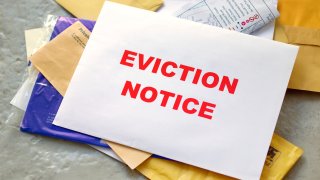
What to Know
- Renters in San Diego who have lost income due to COVID-19 have new protections against eviction
- The program has specific eligibility requirements -- and rules you need to know
- Here are some common questions and answers about the program
Worried about eviction after dealing with COVID? There could be help for you.
The City of San Diego is moving to protect tenants affected by COVID from being evicted without a valid reason.
You can read more about the program from the Legal Aid Society of San Diego. Here are some questions you might have – and the answers.
Get San Diego local news, weather forecasts, sports and lifestyle stories to your inbox. Sign up for NBC San Diego newsletters.
What’s this about protection from eviction?
The city has issued a moratorium on eviction for renters who have lost income due to COVID-19. The moratorium means landlords can't evict an eligible tenant while the moratorium is in effect.
Local
Who is eligible?
Eligible tenants are those whose income have been "substantially" affected by the COVID-19 pandemic and are unable to pay for all or part of their rent. For example, people who lost their job during COVID-19 or because they have a COVID-19 diagnosis may be eligible. It could also include people whose place of employment was closed due to COVID-19.
But it does not include other reasons that people may not be able to pay rent.
When will the protection start?
The protection will be in effect starting July 1, 2022 until 60 days after the mayor of San Diego lifts our local state of emergency (unless the state government states otherwise).
How can I let my landlord know I can’t pay for rent?
You must inform your landlord in writing each month that you are unable to pay for rent and provide supporting documentation. Notification could include writing a letter, an email, or text message.
If notice was provided in person, you should follow up in writing when you provided the written notice. If mailed, send via first class mail with tracking to have proof.
Letters to your landlord must be submitted on or within seven days after your rent is due.
Your landlord may request supporting documentation. You have fourteen days from the date of their request to provide documentation.
Not turning in your letter within the seven days after your rent is due will result in failure to qualify for the moratorium.
What kind of documentation can I provide?
Examples include:
- A letter or note from your job stating you’ve been laid off or that your hours have been reduced due to COVID-19
- For school employees, a letter/text message from schools regarding closures
- Text messages/emails from employers asking you not to come in
- Photo of employment being closed due to COVID-19
What if I am unable to provide notice of inability to pay rent?
You are still protected if you were unable to provide notice due to hospitalizations or other situations where notification was not possible.
Do I still have to pay rent if I am an eligible tenant?
Yes. If you can pay some portion of your rent, you must pay whatever amount you can. You have until the expiration of the moratorium to pay, which will be 60 days after the mayor of San Diego lifts the ordinance.
Does the eviction moratorium include any rent relief assistance programs?
No. However, you can find rent relief assistance programs on this website.
What if my landlord violates the moratorium and wants to evict me?
If your landlord has initiated an eviction proceeding, call 877-534-2524.
For any additional questions, who can I contact?
Legal Aid Society specialists can speak with you Monday-Friday from 9 a.m. to 5 p.m. at the number provided above.